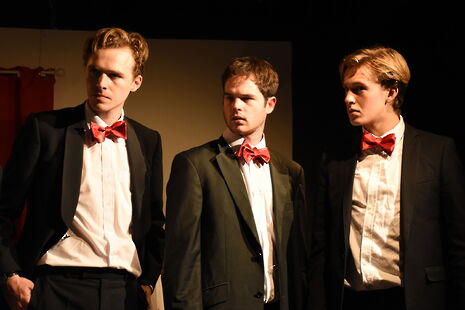Review: Posh
A production that aims high and delivers both humour and darkness, writes Rose Lander

Posh is a unique sneak peek behind the closed doors of Oxbridge’s secret societies. Meet the Riot Club – a thinly veiled fictionalisation of the Bullingdon Club. With nowhere in Oxford willing to host the notorious group, they are holding their termly dinner in a pub outside the city – and we’re all invited. The audience are left unsettled as the extravagant debauchery soon descends to sinister depths.
Without a doubt the best part of the production was the superb acting. There was not a single member of the cast who let the ensemble down. The humour, the grit, the improvisation and the impressive dance moves were all accomplished with flair. Even unexpected mishaps were dealt with deftly by the performers. An unfortunate lighting problem at the very opening of the show left the audience waiting with baited breath while two actors stood on a dark stage for what felt like an age. Dan Sanderson, playing Guy ‘Bellend’ Bellingfield, took the brave initiative to apologise for the technical difficulty, which he did very professionally. The tension was broken, the spectators burst into raucous laughter and the awkwardness was soon forgotten.
Anna Jennings’ direction is brilliant, with quieter, more well-mannered moments contrasting with the riot that ensues. Humour is used very effectively in the opening scenes to reel the audience into the world of the Oxford elite, a task made easier by the familiarity that the Cambridge audience may feel with the characters: the barely understandable Made in Chelsea drawl, the dinner jackets, the bow ties. We share the ‘banter’ with the boys as if we have become members of the club, making the controversial moments in the play even more difficult to swallow as we consider our complicity.
Though the play stands in its own right, though having recently watched the film adaptation, The Riot Club, it is difficult not to draw comparisons. Many elements are perhaps more effective in the screen version. While Alistair Ryle’s unnerving speech about “them” and “us” did succeed in making the audience squirm in their seats, it was softly delivered and could have done with a bit more of the punch that was present in the movie. Perhaps Seth Kruger, playing Ryle, could not quite bring himself to mean the shocking words he was saying, which is very understandable.
The women in the play, powerfully portrayed by Beth Hindhaugh and Isobel Laidler, feature only as marginal characters, there to serve and please the club members. The production succeeds in portraying worrying scenes which raise questions of consent, rape culture and perceived entitlement. Some scenes, including most notably one centred around an escort, been even more powerful if more of the dialogue had been audible throughout. The uproarious behaviour of the men is conveyed very convincingly, with improvisation lending a natural feel to the raucous dinner, though sometimes this was at the expense of the dialogue.
The quiet, chilling end was performed very well – the fight scene involving Kruger and Keir Baker as Chris was hauntingly realistic – and it forces us to come face to face with the strange social elitism in our society: where being a member of the right club gives you a free ticket to power, where despicable things said or done in youth are passed off as “silly japes”, and influential people look after their own.
As the audience leaves the intimate Corpus Playroom, they walk over the stage, through the world of the Riot Club, and are able to see in detail the true extent of the ‘trashing’. All I can say is that I feel very sorry for whoever had to clear it up. I hope they were given a blank cheque…
 News / Caius mourns its tree-mendous loss23 December 2025
News / Caius mourns its tree-mendous loss23 December 2025 Comment / Yes, I’m brown – but I have more important things to say22 December 2025
Comment / Yes, I’m brown – but I have more important things to say22 December 2025 News / Cambridge welcomes UK rejoining the Erasmus scheme20 December 2025
News / Cambridge welcomes UK rejoining the Erasmus scheme20 December 2025 News / CUP announces funding scheme for under-represented academics19 December 2025
News / CUP announces funding scheme for under-represented academics19 December 2025 Interviews / Politics, your own way: Tilly Middlehurst on speaking out21 December 2025
Interviews / Politics, your own way: Tilly Middlehurst on speaking out21 December 2025









